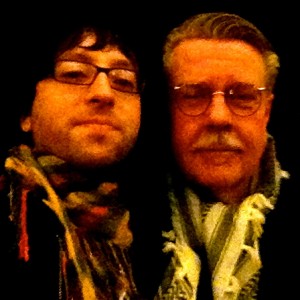I know, to any Swede reading this, that’s a lofty pairing of names, or it takes “chutzpah” to put my name next to those giants of Swedish songwriting (and singing), to use the Yiddish vernacular.
But discovering particularly these two artists, and getting to meet and have contact with one of them (the living one, Mikael Wiehe), has been like finding the key to a treasure chest of fantastic music in another language – for me, and hopefully, in not too long, for English speakers anywhere.
To cut to the chase, one of my many goals is to do an album of Swedish songs translated into English – my own translations, that is. By translating songs that haven’t been translated already, it gives a personal touch, almost as if I was the one who wrote the song. But don’t worry, the folks at the publishing company do a good job of reminding me of the fact that one can’t make any money on a cover, and that goes for translations too…still, it’s an endeavor that feels worth pursuing.
So far, I’ve translated two of Björn Afzelius’ songs into English, Icarus (originally Ikaros) and The Light (Ljuset). Warner/Chappell, Björn’s publishing company, has officially approved the translations:
Ikaros brev Warner: Chappell Ljuset brev Warner: Chappell
The English version of Icarus is on Dogma (on Spotify): Diipak – Icarus
Unfortunately, I came to Sweden a few years too late to meet Björn, or see him in concert, but luckily he left behind plenty of music.
When I first came here, one of the first records I heard (and I mean vinyl) was one by Hoolabandoola Band, a Swedish progg band from the 70’s which both Björn and Mikael sang in. Progg was a politically-progressive music movement which was highly popular in Scandinavia during the 70’s. A lot of the music could be considered, by contrast to the name “Progg,” traditional in that it’s often folk/rock, bordering on country, featuring melody instruments such as electric guitar, flute, brass, or even pan-pipes. Hoolabandoola Band had an especially South American flavor in a lot of the songs and Mikael and Björn even toured Cuba and South America and did their own translations of songs from Spanish into Swedish. Sweden has a significant population of South Americans who emigrated here during the 70’s due to oppression by dictators such as Pinochét in Chile where the great musician and political activist Victor Jara was killed along with thousands of others in a brutal massacre inside a football stadium in 1973.
Translation is a tedious task as one wants to retain the meaning, rhythm, and rhyme of a song, plus that the song should be able to stand on its own without having to have heard the original. On top of this is the challenge of trying to “hear” the song objectively when the one translating it is so familiar with the original. But alas, the work of an artist is never done… *sigh*
I almost forgot, here’s what Mikael Wiehe himself had to say about our album, Dogma:
“Tack för plattan!Behaglig, avspänd, svängig musik. Roligt med duellen bas – sitar (?) på Greatest thing. Mycket 70-talsstämning, lite kollektivfeeling. Roligt att du sjunger Björns låt! Fin översättning.Lycka till!Mikael Wiehe”
Translation:
“Thanks for the album!
Delightful, laid-back, groovy music. Fun with the bass-sitar(?) duel on Greatest Thing. Very 70’s-vibe, kind of a collective-feel. Cool you sing Björns song! Nice translation.
Good luck!
Mikael Wiehe”
For the record (no pun intended), it was an oud, not a sitar, played by Fredrik Schützler who even plays flamenco guitar on the album.
Over and out,
Diipak

